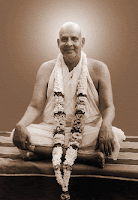THE YOGA OF THE SUPREME SPIRIT
Summary of Fifteenth Discourse
This discourse is entitled “Purushottama
Yoga” or the “Yoga of the Supreme Person”. Here Lord Krishna tells us about the
ultimate source of this visible phenomenal universe from which all things have
come into being, just like a great tree with all its roots, trunk, branches,
twigs, leaves, flowers and fruits which spring forth from the earth, which
itself supports the tree and in which it is rooted.
Sri Krishna declares that the Supreme
Being is the source of all existence, and refers allegorically to this universe
as being like an inverted tree whose roots are in Para Brahman, and whose
spreading branches and foliage constitute all the things and factors that go to
make up this creation of variegated phenomena.
This is a very mysterious “Tree” which is
very difficult to understand, being a product of His inscrutable power of
Maya; and hence a marvelous, apparent appearance without having actual reality.
One who fully understands the nature of this Samsara-Tree goes beyond
Maya.
To be attached to it is to be caught in
it. The surest way of transcending this Samsara or worldly life is by
wielding the excellent weapon of dispassion and non-attachment.
In verses four and five of this discourse
the Lord tells us how one goes beyond this visible Samsara and attains the
supreme, imperishable status, attaining which one does not have to return to
this mortal world of pain and death.
Lord Krishna also describes for us the
wonderful mystery of His Presence in this universe and the supreme place He
occupies in sustaining everything here. The Lord declares that it is a part of
Himself that manifests here as the individual soul in each body. He Himself is
the indwelling Oversoul beyond the self. He is the effulgence inherent in
the sun, moon and fire. He is present as the nourishing element in the earth. He
is the inner witness of all beings.
He is the Supreme Knower even beyond Vedic
knowledge. He is the resplendent Person who is beyond both this perishable
phenomenal creation as well as the imperishable individual soul which is a part
of His eternal essence.
Thus, because He is beyond perishable
matter and superior to the imperishable soul (enveloped in Maya), He is known
in this world as well as in the Vedas as the Supreme Person.












